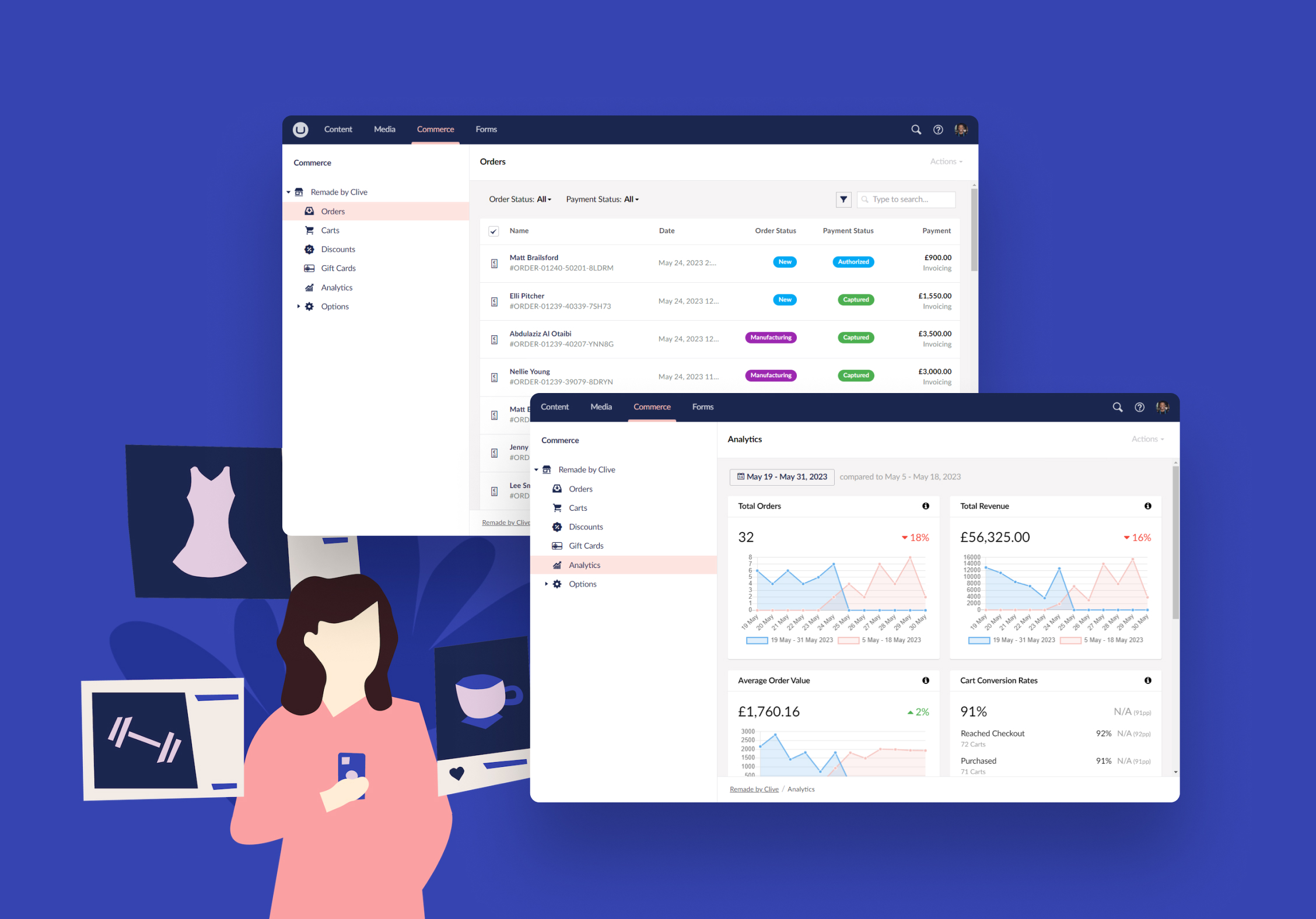It’s no secret; e-commerce sales are booming and showing no signs of slowing down. In fact, the market is expected to grow globally by 10.4% in 2023, totaling over $8.1 trillion by 2026.
If your business is looking to grow with the market, then the importance of choosing the right ecommerce platform cannot be overstated.
From Squarespace and Wix to Magento and WooCommerce, there are many ecommerce platforms to choose from. This blog dials down on two of the most popular on the market - Umbraco Commerce and Shopify - exploring their pros and cons and highlighting the factors which may influence your decision.
From functionality, affordability and ease of use, to customisation and scalability, we dive into the details that set these platforms apart, and share which packs the biggest punch.
Umbraco Commerce: the pros and cons
Umbraco Commerce is a highly-customisable ecommerce platform that offers unparalleled flexibility. It allows businesses to create solutions tailored precisely to their unique requirements. With its .NET-based platform, Umbraco Commerce is incredibly versatile and can serve the needs of both small startups and large, established businesses.
One of the standout features of Umbraco Commerce is its seamless integration with the Umbraco CMS, known for its flexibility, scalability, and user-friendly content management features. This integration simplifies the process of managing and updating product listings, blogs and more. Umbraco Commerce also excels in handling multilingual and multi-currency requirements, making it an ideal choice for businesses targeting global markets.

A key advantage of Umbraco Commerce is, unlike many other ecommerce platforms, it doesn’t charge transaction fees, meaning you can keep more of your profit.
However, to unlock the full potential of Umbraco Commerce, you need both time and technical expertise. And this may not be realistic for smaller businesses operating to smaller budgets.
Umbraco Commerce: Key Stats
- 731,438 active instals
- 221,745 active members in the community
-
1,211 integrations available

Shopify: the pros and cons
Shopify is a user-friendly e-commerce platform that is celebrated for its ease of use. It offers a wide variety of third-party apps and integrations, allowing you to extend functionality and incorporate new features with ease. Shopify's themes are all designed to be mobile-responsive, ensuring your online store looks the part, and performs efficiently across all devices; a big plus in today's mobile-centric world.
One of the significant advantages of Shopify is that it takes care of hosting and security, relieving businesses of the responsibility of managing these aspects. This can be particularly advantageous for smaller companies with limited resources.
However, while Shopify does offer customisation options, it may not be as flexible as Umbraco Commerce. And businesses with highly-specific needs might encounter some limitations.
Additionally, Shopify imposes transaction fees on certain payment gateways unless you use their in-house payment system, which can add to the cost of running your store.
Shopify: Key Stats
- 2.1m daily users
- 41% of the market share in the UK
- 457 million people bought from a Shopify store in 2022
-
Over 50% of Shopify stores see repeat purchases
Factors influencing your decision
Now that we’ve discussed the ins and outs of both ecommerce platforms, let’s consider the factors that may influence your decision:
-
Business Size: Umbraco Commerce is an excellent choice for larger enterprises that require extensive customization and scalability. In contrast, Shopify's user-friendliness and hosting make it a strong candidate for smaller businesses.
-
Budget: Consider your budget and whether you can accommodate the monthly fees associated with Shopify. Umbraco Commerce may offer a more cost-effective solution, especially if you have the technical expertise to manage it.
-
Customisation Needs: Assess the extent of customisation your business needs. If your requirements are highly unique, Umbraco Commerce's flexibility may make it the better choice.
-
Technical Expertise: Your level of technical expertise or access to developers can significantly impact your decision. A simple Shopify store can be set up with no developer input, while Umbraco Commerce may require more development resource, as it’s not a hosted SaaS product.
-
Global Reach: If you have plans to target international markets, Umbraco Commerce's robust localisation features could provide a distinct advantage.
The experience to transform your experience
The choice between Umbraco Commerce and Shopify is an important one, and all hinges on your business's specific requirements, objectives and ambitions. But whatever your requirements, we’re here to help guide your decision.
As an Umbraco Gold Partner, we’ve built over 250 digital experiences since we started out in 2008. So, if you’re looking to upgrade your existing ecommerce platform, or build a new one from the bottom-up - we’ve got the experience to make it happen.
To find out more, check out our digital experience services and get in touch today.

Ready. Steady. Grow!
We've helped some of the world's biggest brands transform and grow their businesses. And yours could be next.
So if you've got a business challenge to solve or a brief to answer, we'd love to hear from you. Simply complete this form and one of our experts will be in touch!




